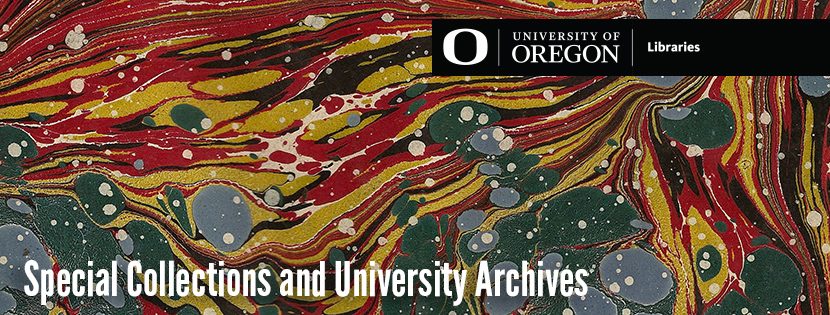Meeting the Needs of an International Scholarly Community during a Global Pandemic
Since June 2020, despite the pandemic, Special Collections has been busy fulfilling the needs of an international scholarly community that represents the majority of its users. In March 2020, our facility was closed to the public, and only recently have we been able to serve UO-only constituents onsite. The vast majority of those classified as non-UO users are graduate students, professors, and independent writers. They are engaged in research that will manifest articles, dissertations and books providing new scholarship on a variety of subjects and issues.
In June 2020, we worked out a plan to meet the needs of this research community. We borrowed a UO Libraries’ public use scanner and reassigned undergraduate students to perform the digital capture. Researchers contacted us about their research and the Public Services Librarian for Special Collections worked to refine their needs and identify portions of the archival collections integral to their research. Once this process was completed, collection material, mainly stored in archival boxes, were retrieved from both the Knight Library stacks and the Baker Center off-site storage facility. We essentially converted our workflows to a virtual-based request and delivery process to meet these vital needs.
In order to comply with pandemic rules established by campus, the paging and handling of the material required staggered schedules and quarantining. Deliveries from Baker, for example, were accomplished by our Collections Manager on weekends. Collections paged were quarantined for three days each time they were touched during the paging and scanning process. Even with these barriers, we were able to maintain an average turn-around time of 11 days per request.
In May 2021, we reached a milestone of 50,000 digital images (in PDF file format) created for this non-UO user group. Here are some descriptions of research projects supported by our in-house scanning service during the pandemic, which show the wide variety of topics covered by these researchers.
Graduate student studying history at the University of Copenhagen:
“I am currently writing a project on the second coming of the Ku Klux Klan. More specifically I want to tie the emergence of the Klan to theories like Status Anxiety in order to try to account for the swift growth the Klan showed.”
Professor at Université Savoie Mont Blanc:
“Studies of the Farmers’ Alliances and the Populist movement in the 1890s usually focus on leaders’ texts and I would like to study the movement from the experience of grassroots sympathizers.”
Historian based at Community College of Philadelphia:
“Researching the field of industrial lighting and specifically an article Charles Morrow Wilson published in 1936 in Popular Mechanics titled “Miracles of Light.” I’m specifically interested in the dinner party lighting experiment anecdote at the beginning of the article, at the center of which is the electrical engineer Samuel G. Hibben.”
Professor of History of Science at University of Minnesota:
“I am working on Josephine Tilden and her study of Pacific algae and would be interested in seeing the diary and correspondence relating to Bernice Leland’s trip to Tahiti and New Zealand in 1909-1910.”
PhD Student at University of Wisconsin – Madison
“I am currently working on my dissertation, which is focused on climate medicine and the relationship between place and healing. I am currently working on a chapter focused on the legacy of Morningside Hospital as a holding place for the “insane of Alaska” and the arguments made about Portland as a healing place.”
Historian at the Historical Archives YMCA of Thessaloniki
“The YMCA of Thessaloniki, Greece, is celebrating its Centennial next year (1921-2021) and we are trying to get hold of copies of archival material deposited in libraries or archives around the world regarding YMCA activities in Greece.”
Journalist and Author:
“I’m writing a biography of Tanaquil Le Clercq, an important ballerina of the 1940s and ’50s, wife of the choreographer George Balanchine. Her father, Jacques Le Clercq, was a writer, professor of French literature, translator, and editor for Brentano’s. In support of Le Clercq’s application for a Guggenheim Fellowship, Lowell Brentano wrote a reference letter in which he says that he and Le Clercq have written a play together.”
-David de Lorenzo (Giustina Director) and Lauren Goss (Public Services Librarian)


This is a fascinating glimpse into the global connectedness and variety of these special collections. Even with a pandemic, the show must go on. It is nice that these projects could move forward.